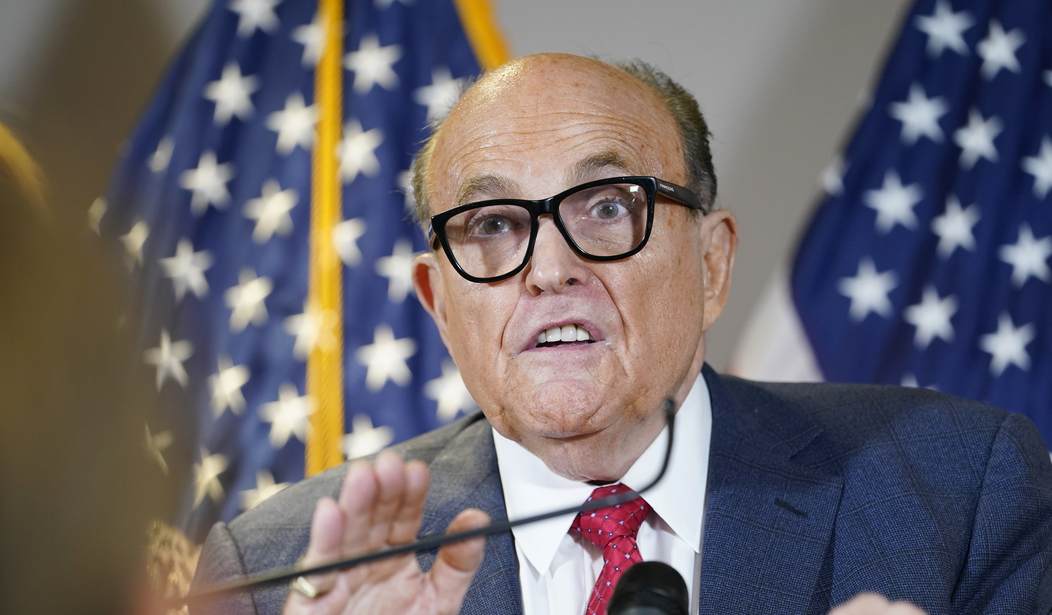Bold strategy, Cotton. Let’s see if it pays off.
In a court filing last night, Rudy Giuliani admitted he lied about a key allegation that fueled the “Stop the Steal” movement in Georgia. Giuliani and others in Donald Trump’s post-election efforts accused two election workers — a mother and daughter — of manipulating ballots to wipe out Trump votes. A video of the ballot processing fueled this allegation, even though Georgia election officials insisted it showed nothing out of the ordinary.
Giuliani admitted to making false statements in accusing the two women, who are suing him for defamation. But Giuliani asserts in the same filing that he has a First Amendment right to, er … promote falsehoods, or something:
Rudolph W. Giuliani has admitted that while acting as a lawyer for former President Donald J. Trump, he made false statements in asserting that two Georgia election workers had mishandled ballots while counting votes in Atlanta during the 2020 election.
The admission by Mr. Giuliani came in court papers filed on Tuesday night as part of a defamation lawsuit that the two workers, Ruby Freeman and Shaye Moss, had brought against him in Federal District Court in Washington in December 2021.
In fact, Giuliani even admits in the filing that his statements were “defamatory per se,” and that they were both false and “actionable,” and that he was no longer disputing the factual allegations made by the two women. That in itself might be news to people who have stood by the claims made by Giuliani and Team Trump for more than two and a half years. Many of them refused to believe efforts to debunk these claims because Trump’s attorneys kept asserting them as fact, especially Giuliani.
This sounds as though Giuliani has essentially surrendered. That’s not quite the situation, at least not in intent:
But Mr. Giuliani, insisting that he still had “legal defenses” in the case, said that he continued to believe his accusations about Ms. Freeman and Ms. Moss were “constitutionally protected” under the First Amendment. He also refused to acknowledge that his statements had caused the women any damage — a key element required to collect a judgment in a defamation case.
The declaration, which was filed as Mr. Giuliani was confronting potentially painful sanctions for having purportedly failed to live up to his discovery obligations in the case, appeared to be part of an effort to resolve the suit without having to pay too much — or any — money.
Ahem. The First Amendment offers broad protection for speech, but it does have its limits. Not only is defamation among those, it’s also a civil issue rather than criminal. Giuliani used his access to the courts and the press to ‘publish’ false statements, so his 1A rights have not been abridged. The Constitution doesn’t protect against the civil consequences of speech when it comes to defamation, however, as Nick Sandmann taught CNN and as Dominion taught Fox News. It’s true that the plaintiffs still have to show actual damages in court, but turning two “private persons” (in Sullivan terms) into public figures of outrage probably makes that process somewhat easier. If they’ve had to move, or change their phone numbers, or had difficulty maintaining employment during the last 32 months on account of the harassment and notoriety Giuliani created around them, or even had to pay attorneys, a jury won’t have much trouble deciding on actual damages — and then start considering punitive damages.
There’s a reason why the other respondents to this defamation suit have all settled, you know.
So what is Giuliani trying to do? Presumably, Giuliani will try to thread a needle of intent by arguing that he didn’t know these were lies when he said them. But intent isn’t entirely at issue with “private persons” in defamation suits. Gross negligence also counts — it did in the Sandmann and Dominion cases. And since Giuliani was/is an officer of the court, he has an even higher duty to ensure that his statements are grounded in fact or evidence. Also, when Giuliani knew these statements were false is part of the consideration. Did he correct the record as soon as he realized it? If not — and this very belated admission in court indicates that he’s been aware of it for some time — it suggests that defamation was intentional.
Maybe Giuliani really does think that he can squeeze by on a 1A claim. That’s a big bet, though. Giuliani better hope he can cover it.
Finally, this should make plain that the Stop the Steal campaign was always legally and morally bankrupt. They knew that their claims were outlandish and false, and yet stoked a conspiracy-theory reaction to the 2020 election anyway, with lasting damage all around. This glib admission by Trump’s top election-challenge attorney should break the spell. Will it?
Note: I am still on vacation and won’t be back for a couple of weeks. Unless, of course, I get bored again and want to write.









Join the conversation as a VIP Member